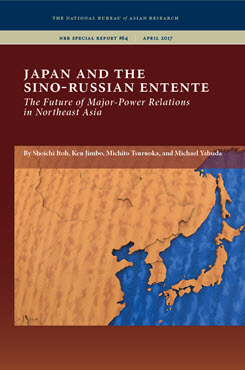Sino-Russian Military Cooperation and Japanese Defense Policy
This essay examines recent developments in Japan-Russia relations and assesses the implications of both China’s rise and the U.S.-Japan alliance for this relationship.
EXECUTIVE SUMMARY
MAIN ARGUMENT
The Soviet Union represented the primary threat to Japan’s national security during the Cold War. To address this threat, Japan relied on the extended deterrence provided by the U.S. under Article 5 of the U.S.-Japan Security Treaty. The end of the Cold War, however, reduced Japanese perceptions of the threat from Russia, and in recent years Japan has explored opportunities for greater security cooperation as a way to counter China’s rise. Most significantly, in November 2013 the two countries held their first two-plus-two meeting, which is a security dialogue formula that Japan had previously only used with the U.S. and Australia. At the same time, since forging a strategic partnership in 1996 and concluding the Sino-Russian Treaty of Friendship in 2001, China and Russia have worked to deepen their military cooperation. Although Russian arms transfers to China have declined since the mid-2000s, the two countries continue to strengthen cooperation on common national security interests—for example, through their Joint Statement on Strengthening Global Strategic Stability in June 2016 and their first naval exercise in the South China Sea in September 2016. Against a backdrop of heightened Russian military activity in the waters and airspace surrounding Japan, this trend of closer Sino-Russian security relations has caused great consternation among Japanese policymakers.
POLICY IMPLICATIONS
- As the expansion of China’s anti-access/area-denial capabilities threatens to erode the foundation of the U.S. security commitment in Asia, Japan must continue to upgrade the security alliance to ensure the U.S. military’s operational access in East Asia.
- Japan must work to enhance regional security cooperation by expanding its trilateral relationship with the U.S. and South Korea—as well as with the U.S. and Australia—through consultations, joint exercises, and information sharing.
- In order to reduce strategic and operational tensions with Russia, and to dilute the strategic utility of Sino-Russian military relations, Japan should seek opportunities to enhance cooperation in functional areas such as search and rescue, humanitarian assistance and disaster relief, and antiterrorism operations. Enhancing security relations with Vietnam could also provide an opportunity for greater coordination with Russia on capacity building. </li


